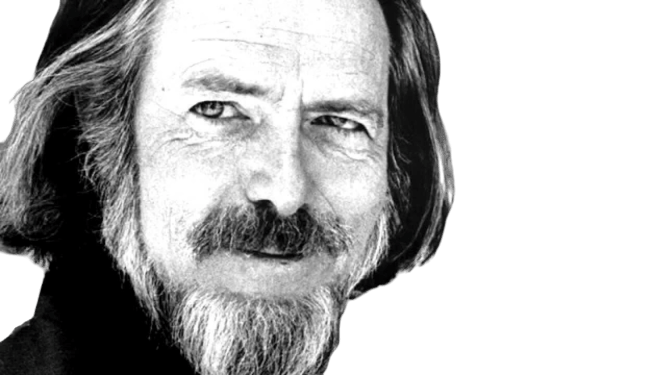ZEN: The Momentous Harmony

Historically, Zen is the embodiment of the common truth contained in the Hindu-Buddhist tradition and the Taoist tradition, the synthesis of the contemplative insight of Indian religion, the dynamic liveliness of Taoism, and the down-to-earthiness of Confucianism. Zen is grounded precisely in this faith or trust that ordinary life is Tao and is to be accepted or loved as such.
ZEN: The Momentous Harmony – A New Book by Alan Watts
By Alan Watts
The Zen master Chao-chu was asked, “What is the Tao?” He replied, “Everyday life is the Tao.” “How,” pursued the inquirer, “does one get into harmony with it?” “If you try to get into harmony with it, you will get away from it.” The attempt suggests the absence of the Reality, and proceeds from lack of faith in the truth that harmony already is. Lack of faith in this harmony creates a sense of inadequacy and insecurity, which underlies all our aggressive and evil actions.
But Zen is more than a synthesis of these various Trends in Indian and Chinese religion. The unique contribution of Zen to higher religion is its method of presenting the truth, a method involving “No dependence on words and letters and direct pointing to the soul of man” — that is, to the Tao, Buddha-nature, or Reality itself.
It is all too easy for ideas and concepts to conceal rather than reveal Reality. Thus, the Zen masters say that ideas are fingers pointing at the moon of Reality, but that most people mistake the finger for the moon.
Furthermore, we have already seen that it is quite impossible for ideas to describe or convey the deepest the truth of life, since ideas are forms and Reality is too.
Living to be held in any form. Zen, therefore, does not consist of acquiring new ideas about Reality and our relation to it; it consists of getting rid of ideas and feelings about life in order that we may get to life itself.
The statement that ordinary life is Tao, or that we are one with Reality just as we are, here and now, is still the idea, and while it remains an idea it is still an attempt to capture the living truth in a fixed formula. Really to understand Zen we have to get away from this abstract and the dead realm of concepts and come face-to-face with Reality as it stands quite clearly before us here and now.
There is only one place where we are truly alive, where we come into immediate contact with Reality, and that is now — this present moment. The past was only real when it was the present moment, and the future will only be real when it becomes it. The past continues to be real to the extent that it lives on effectually in the present. But real life is always now.
In fact, we have no knowledge of any other reality than the present moment, and, strictly speaking, nothing Has any existence save in this moment. Yet what we call the present moment is strangely elusive. As soon as we try to catch hold of it, it seems to run away. We cannot delay or hold it in any of the forms which it assumes or contains. We have moments of pleasure and moments of pain, but when we try to grab hold of the moment of pleasure, the moment, the movement, the life leaves the pleasure, and it turns to dust in our hands. So, too, when we try to examine the moment, we cannot discover it, for it is too small to see. The more we look for it, the tinier it becomes, until we realize that it is infinitesimal and thus infinite.
Yet however much we may try to delay or grasp the moment, the fact remains that while from one point of view, it eludes us, from another, we cannot get away from it. We may try to lag behind in the past or to hurry on into the future, but inevitably we do our lagging or hurrying in the present moment. As soon as we realize that the moment is, in reality, inescapable, we shall no longer try to grasp it; for whether we know it or not, it grasps us. For now, this present moment is Reality. All things proceed from it and exist in it, and yet when we look at it directly, it seems nothing.
Now is Tao, and Tao is now, and even though we do our damnedest to possess it, we are still unable to get out of it. Our union with Reality is the truth whether we realize it or not, whether we strive to attain it or not.
 But to say that the now is Tao, or is Reality, at once introduces a concept which, useful though it may be for a time, instantly distracts our attention from the Real now. At once our religion becomes dead and removed from life, for although this now, this eternal moment looks so void and so uninteresting to sense and thought, in fact, it is the mysterious source of all Liveliness and power. The genius of Zen lies in its way of pointing to the real now without distracting the Attention with concepts. But the human mind, because of its inherently possessive nature, let’s go of concepts with extreme reluctance, for which reason Zen has sometimes to attack and smash them quite violently. Thus, its technique has often the appearance of spiritual shock tactics.
But to say that the now is Tao, or is Reality, at once introduces a concept which, useful though it may be for a time, instantly distracts our attention from the Real now. At once our religion becomes dead and removed from life, for although this now, this eternal moment looks so void and so uninteresting to sense and thought, in fact, it is the mysterious source of all Liveliness and power. The genius of Zen lies in its way of pointing to the real now without distracting the Attention with concepts. But the human mind, because of its inherently possessive nature, let’s go of concepts with extreme reluctance, for which reason Zen has sometimes to attack and smash them quite violently. Thus, its technique has often the appearance of spiritual shock tactics.
This is an excerpt of the book Zen by Alan Watts • Buddhism / Gift • Hardcover Roundback • 80 pages Black-and-White Drawings & Calligraphy • Courtesy and permission from the publisher “New World Library”.
You will also enjoy Some of Our Buddhas Are a Bit Bonkers
About Alan Watts
Alan Watts was a British philosopher who interpreted and popularized Eastern philosophy for a Western audience. Born in Chislehurst, England, he moved to the United States in 1938 and began Zen training in New York. Random House has posthumously realized a new work by Alan Watts called Zen.
OMTimes Magazine is one of the leading on-line content providers of positivity, wellness and personal empowerment. OMTimes Magazine - Co-Creating a More Conscious Reality






